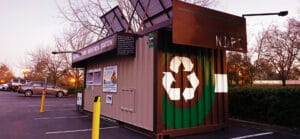
Green Education Foundation is Partnering with Local Cities Like Marina, California to Tackle Textile Waste Problem
Mayor Bruce Delgado from the City of Marina in Northern California partnered with a local Non-profit, Green Education Foundation, to start a Recycling and Donation program in his city to divert textile waste form the city’s landfills but also to support recycling education in schools and help fund the City of Marina’s youth programs.
Mayor Delgado stated “The program has been in place almost 4 years and it costs the city nothing but provides monthly funding for Marina’s youth programs as well as offering our students new backpacks during their backpack exchange programs. “
Charlene Nijmeh, Chairwoman of the Green Education Foundation stated “We are proud to partner with Marina and Mayor Delgado because our values towards the environment and supporting our youth are aligned.”
This really makes a lot of sense for municipalities who need to supplement their recycling efforts by partnering with private sector recycling programs. Cities have long struggled with recycling textiles due to the nature of the material. Municipal curbside pickup programs have never fared well since the material collected inevitably becomes contaminated during the process. So, programs like Green Education Foundations where they place collection units throughout the city in conveniently placed parking lots work extremely well because they are community-oriented collection points that are accessible, convenient, and well maintained.
Green Education Foundation has developed a high-tech donation-textile recycling unit that is monitored 24 hours a day to ensure that the city’s and property owner’s concerns of site maintenance is addressed. The units are solar powered and require no utility hookups, so they are easily placed and non-permanent units.
All these attributes convinced Mayor Delgado to give the program a try and after 4 years of working with Green Education Foundation, Mayor Delgado said “It has been such a positive program for the City of Marina that I would recommend this to any City in order to enhance their existing recycling program”
The world is waking up to the clothing industries’ poor environmental record. The Textile industry is considered as the most ecologically harmful industry in the World. In fact, it is the second largest polluting industry in the World after oil and gas.
Textile production is estimated to be responsible for about 20% of global clean water pollution from dyeing and finishing products. In most countries where garments are produced, untreated toxic wastewaters from textile factories are dumped directly into the rivers. The world uses 1.3 trillion gallons of water each year for fabric dyeing alone. In areas already facing water stress, this can be particularly damaging. It is estimated that 10% of Global carbon emissions are caused by clothing and footwear production.
And Fast fashion has only led to an increase in consumption. The average consumer bought 60% more clothing in 2014 than in 2000 but kept each garment half as long. This trend has continued to grow. By 2030, there will be 5.4 billion people in the Global middle class. If consumption continues at its current rate, we’ll need three times as many natural resources by 2050 compared to what we used in 2000.
It might surprise you to learn that around 85% of textiles thrown away in the U.S. are dumped into landfills or burned — including unused textiles and unsold clothes. Furthermore, it is estimated that the average American throws away about 37kg/81 pounds of clothes every year– that’s the weight of an 11-year-old child! And that’s only counting the U.S. To give you an idea of how big the global textile waste crisis is, imagine a garbage truck fully filled with textiles and clothes being thrown into landfills every single second of the day, every year.
The idea that Cities alone should tackle this huge problem of textile waste is not reasonable. The problem is so large that everyone in the public and private sectors need to be thinking of how to collaborate on solutions together. Its going to take everyone working together to make any perceptible impact.
Green Education Foundation’s NDRS program diverts 60 million lbs. of textiles each year

